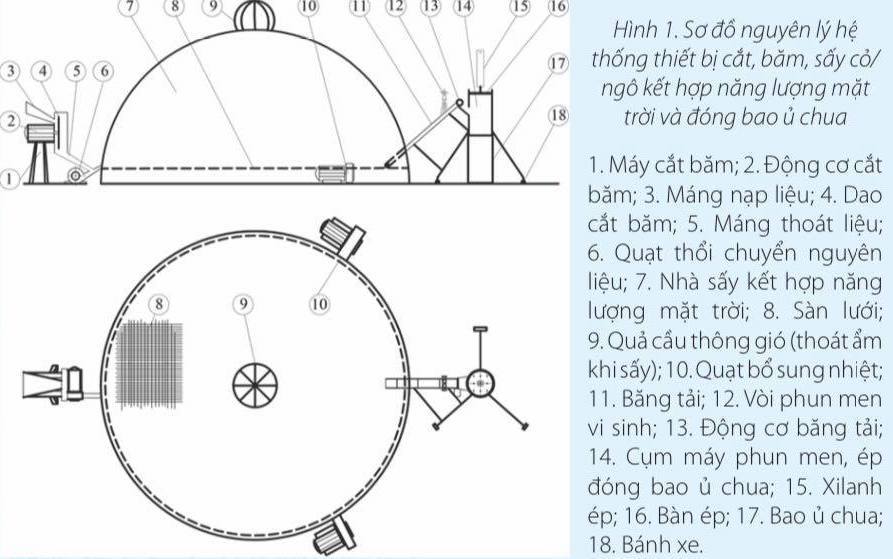 |
|
The five students received first prize in the 16th National Youth and Children's Innovation Contest 2020. |
The team of five students from Hanoi includes Le Thi Thanh Huyen, Nguyen Quynh Huong Ly (Cau Giay High School); Le Minh Hieu (Pascal Secondary School); Trinh Ha Phuong (Van Dien Secondary School) and Nguyen Huong Minh Trang (Giang Vo Secondary School).
In an interview with VietNamNet, Nguyen Quynh Huong Ly, a member of the group, explained that the group has been researching domestic and foreign documents, collecting and consulting experts to implement the project, which is called ‘Systematic model equipment for cutting/chopping, drying grass/maize, using solar energy and bagging silage for animal feed’. This stems from the actual demand for silage for livestock and development of mulato grass fields in Binh Thuan, Ha Nam, Ba Vi (Hanoi) and Moc Chau (Son La).
A visual working model was created describing the operation of a closed equipment system, and the processing of cattle silage, including cutting - mincing (3-6 mm), drying grass/corn using solar energy (reaching 65-70 percent moisture content), spraying probiotics, and bagging silage.
 |
|
Nguyen Quynh Huong Ly, a team member. |
“To help the growth of Vietnam's livestock industry, our hope is to put it into action,” Huong Ly said.
Because her grandparents lived in Thanh Hoa and had a farm and animals, Huong Ly was exposed to the realities of rural life when she visited her hometown. The team consists of five students from four separate school, but they all have the same goal in mind.
As a first step in this project, three components must be assembled securely: hash cutters, a drying house powered by solar energy, and a bagging machine.
The electrical wires of the control cabinet are connected to the fan motor, the chopper, the conveyor motor, and the heat-adding fan motor; and the press cylinder is connected to a hydraulic/pneumatic source (the conveyor and the presser cylinder work in unison to a programmed rhythm when the material is full).
If the moisture content of the material is more than 70%, the operator uses a fan, seals the door securely, and conducts the drying process to the appropriate humidity.
 |
To begin the next phase, the drying house door is opened, the conveyor is turned on, and the probiotic nozzle is inserted into the press chamber. The conveyor will stop, and the presser of the moving cylinder compresses the material tightly into the PP/PE bag, which is then blown out through the holes in the press up. A rubber band is needed to secure the mouth of the presser as it rises after a hard press. Using the next set of bags, the identical procedure will be followed. In around 21 days, the silage product may be fed to animals without any further processing.
New endeavor
This research by the group of young students is described in the Vietnam Yellow Book of Innovation 2021 as an entirely new topic. Drying raw materials for silage in a glass cage instead of outside is convenient, clean, and saves surface space while also saving energy by utilizing solar radiation and the glass cage effect. Silage-making machines that use air or hydraulic cylinders and pressers to compress grass and corn into silage bags are new and transportable.
Moreover, cutting, mincing, drying and spraying probiotics on the same machine provides a closed manufacturing process toward industrial production, which is a major innovation in this field of research. The drying house powered by solar energy may also receive raw materials of grass and maize that have been gathered and cut by specialized machinery in the field. The chopper isn't required to function at that point, illustrating the system's mobility.
 |
|
The Vietnam Yellow Book of Innovation 2021 features research of the group of students. |
Ventilation doors can be opened at the bottom edge of the mesh floor so that the natural drying process can be carried out and the product is not harmed by being stacked up when there is no sunlight (at night, or during rain or power outages). There is a wide range of materials readily accessible on the domestic market, and the process of creating it is straightforward.
Closed, dust-free setting of this research conducted by the group also helps minimize environmental impact. Combining radiation and the glass cage effect for drying, lowering the moisture content of raw materials for silage, without exposure to the sun, is simple, clean and saves time and space. Organic, clean, and quality-controlled livestock products are the future of agricultural sphere.
It is also possible to decrease heavy labor by shifting livestock production towards industrial production, maximizing productivity, cutting costs, and using livestock machinery to guarantee adequate feed for cattle.
Vietnamese agriculture, according to Huong Ly, is a matter of concern today. Preservation of animal feed is required to both improve quality and provide assistance for farmers.
Huong Ly is now a student at Hanoi Law University as a freshman. The remaining four members, Le Thi Thanh Huyen, Le Minh Hieu, Trinh Ha Phuong, and Nguyen Huong Minh Trang, are still in middle and high school.
After winning the top place in the 16th National Youth and Children's Innovation Contest conducted by the Union of Science and Technology Associations and Vietnam Engineering in 2020, the research of the group of Hanoi students' was featured in the Vietnam Yellow Book of Innovation 2021.
Minh Anh

VN girl's bumpy road to the world's leading research institute
As a student who once failed entrance exams to universities, Doan Thi Hai Duong has just won a scholarship with a monthly stipend of 2.800€ in a doctoral program at Max Planck for Plant Breeding Institute – Germany.

Female valedictorian discovers security vulnerabilities of US tech giant Oracle
Before becoming valedictorian at the Academy of Cryptography Techniques, Le My Quynh had been been honored by a US tech group for her discovery of important security flaws.